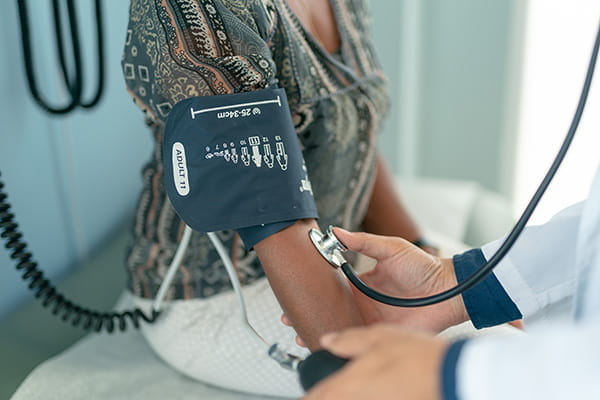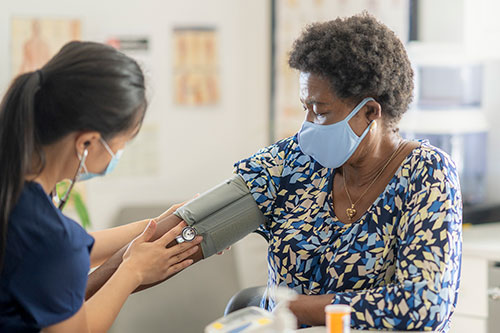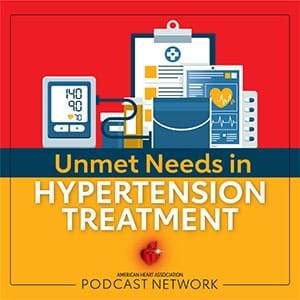Hypertension,
Unmet Needs in Hypertension Treatment
Vodcasts
Mastering Telehealth in Hypertension Management:
Essentials, Resources, and Equity in Modern Care
This vodcast explores the role of telehealth in hypertension management, covering its definition and the key components for a successful virtual visit, such as self-measured blood pressure and treatment protocols.
Empowering Hypertension Management
This vodcast delves into the essentials of home blood pressure monitoring (HBPM). Experts discuss why HBPM is crucial for managing hypertension effectively and discover the various benefits it offers to patients.Pressure Proof:
Mastering The Art and Science of Hypertension Management
In this vodcast episode, we dissect evidence-based approaches to hypertension management, from lifestyle interventions to single-pill combination therapies.
Healthy Lifestyle, Healthy Blood Pressure
In this vodcast, watch experts detail the importance of diet, exercise, and other behavioral modifications in lowering and maintaining blood pressure.Hypertension Uncovered: Expert Insights into Addressing Unmet Needs in Management
Engaging learners by giving them the opportunity to interact with subject matter expert faculty from each of the vodcasts in real time and ask questions regarding key discussion points from the series.Videos on Demand
Unmet Needs in Hypertension Treatment Options
Renal Denervation in the Treatment or Resistant Hypertension
Learn from experts how to treat resistant hypertension with renal denervation, focusing on patient selection, assessment, management, procedure, and follow-up.
Supported by an education grant from Medtronic.
Resistant Hypertension Management Options
Shared Decision-Making and Hypertension Treatment
Join this webinar to learn how shared decision‑making enhances hypertension care by promoting patient‑centered treatment, boosting adherence through alignment with patient preferences, and overcoming implementation barriers.
Supported by an education grant from Medtronic.
Health Equity and Hypertension Treatment
Launch this webinar where experts explore healthcare disparities in hypertension care and share strategies to achieve blood pressure control for all, ultimately improving patient outcomes.
Supported by an education grant from Medtronic.





Podcasts

Unmet Needs in Hypertension
Drugs or Devices for the Resistant Hypertensive Patient
The Renaissance of Renal Denervation
Team-based Hypertension Care in the Clinic: A Success Story
Managing hypertension is complex as you consider aspects of taking multiple medications, lifestyle changes with diet and physical activity, and learning monitoring of blood pressure at home. As supported by guideline recommendations, team-based care among multidisciplinary healthcare professionals is important to optimize blood pressure control. Our discussion focuses on the experience at the Trinity Free Clinic in Carmel, Indiana in which a multidisciplinary team successfully manages patient hypertension.
Lifestyle: Decisions for Daily Life
Weight management, physical activity, and a heart-healthy diet are key behaviors in managing blood pressure and essential to lifelong good health. What role do clinicians play in shared decision-making discussions with hypertensive patients around daily lifestyle decisions? What steps can clinicians take in providing guideline informed hypertension management that is equitable? Listen as a cardiologist and two nephrologists share their experiences and consider how to help patients address behavior modification barriers for those living with hypertension.
Shared Decision-Making and Adherence
While patients may have different goals and preferences for treatment, which can make selecting the best hypertension management plan difficult, adherence may be increased if the plan aligns with the patient’s preferences. What approaches in shared decision-making may improve adherence?
In this episode clinicians and a patient discuss changes in terminology when talking about patient compliance to the use of adherence and non-adherence. These changes are part of the larger shift to shared decision-making in patient care. Listen and learn how to employ shared decision-making across a range of care settings.
Home Blood Pressure Monitoring with Clinical Support
Home blood pressure monitoring is informative but inaccessible for some outside of strengthened clinical support. Current guidelines comprehensively address how to define, measure, and treat high blood pressure, and yet hypertension management in special patient populations has not been systematically addressed. Listen and learn how clinicians can utilize shared decision-making to better engage patients in their health care and support improved health equity.
A Toolkit for Health Care Professionals
This toolkit enhances collaboration and communication across an interdisciplinary health care team and helps increase patient education. Content includes knowledge and tips that can be put in practice immediately such as management strategies, non-pharmacological and pharmacological interventions, resistant hypertension, shared decision-making based on patient values/goals, and more.Comprehensive Guide on Hypertension

Statements and Guidelines
Hypertension,
Hypertension,
Hypertension,
Hypertension,
Hypertension,
The Need for Improved Assessment and Management of Hypertension
 Contributing to a high prevalence of hypertension is suboptimal awareness and blood pressure control. More than one-third of US adults (38.8%) are not aware they have hypertension.1 Although awareness of hypertension has improved in the last 2 decades, data from 2015-2018 indicate that only 50.4% of adults with hypertension are receiving treatment, and only 21.6% have their blood pressure controlled.1 Awareness, treatment, and control of high blood pressure differs by race/ethnicity, with Mexican American males having the lowest prevalence of awareness, treatment, or control.1 The continual increase in high blood pressure prevalence indicates the need for improved assessment and management of hypertension.
Contributing to a high prevalence of hypertension is suboptimal awareness and blood pressure control. More than one-third of US adults (38.8%) are not aware they have hypertension.1 Although awareness of hypertension has improved in the last 2 decades, data from 2015-2018 indicate that only 50.4% of adults with hypertension are receiving treatment, and only 21.6% have their blood pressure controlled.1 Awareness, treatment, and control of high blood pressure differs by race/ethnicity, with Mexican American males having the lowest prevalence of awareness, treatment, or control.1 The continual increase in high blood pressure prevalence indicates the need for improved assessment and management of hypertension.
References
Virani SS, Alonso A, Aparicio HJ, et al. Heart Disease and Stroke Statistics-2021 Update: A Report From the American Heart Association. Circulation. 2021: CIR0000000000000950. Carey RM, Sakhuja S, Calhoun DA, et al. Prevalence of Apparent Treatment-Resistant Hypertension in the United States. Hypertension. 2019;73(2):424-431.
